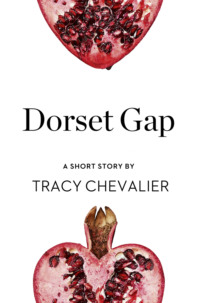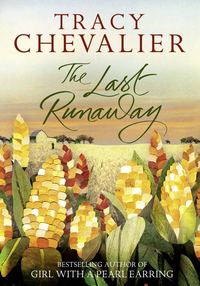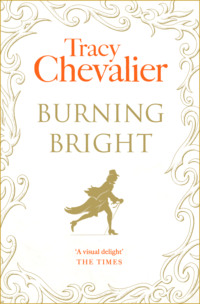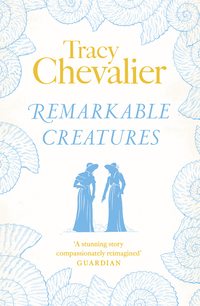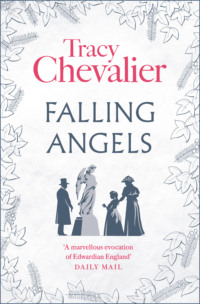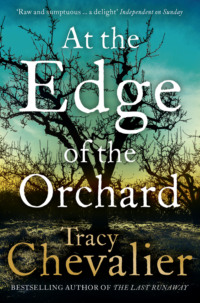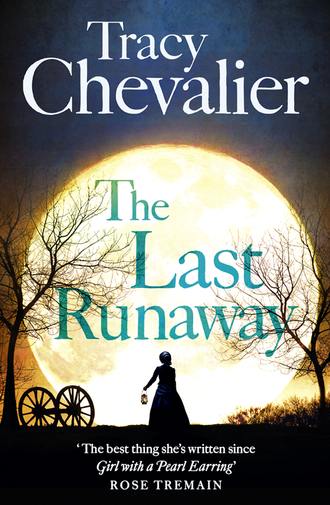
Полная версия
The Last Runaway
Before bundling up the clothes for burning, Honor defied the doctor: she got out her scissors and cut a piece of material from Grace’s chestnut-brown dress. One day she would use the cloth for part of a quilt. And if it was infected with fever and killed her, then that was God’s will.
Though she had not cried when her sister passed – Grace was in such a state at the end that Honor prayed for God to release her – once she’d handed over the clothes and the quilt, she hid in her room and wept.
Thomas seemed to prefer silence as much as Honor did; he asked no questions, and for the first time since reaching land in America she was able to sit and look about without other passengers or the worry over her sister to distract her. Though they drove into darkness, soon the sun rose behind them, tinting the surrounding woods in a soft light. Birdsong intensified until it became a frenetic chatter, most of the sounds unfamiliar to her. She was startled too by the vivid plumage, in particular a tufted scarlet bird with a black face and a blue bird with black and white striped wings, their raucous screams scattering smaller, duller birds. She wanted to ask what they were, but did not like to disturb Thomas. Her companion sat so still that she would have thought he was asleep except that every few miles he stamped his foot twice and shook the reins, seeming to remind the fat grey mare pulling them that he was there. The horse was not fast but she was steady.
They were on a much smaller road than any Honor had ridden along in the stagecoaches through New Jersey and Pennsylvania. There she and her sister had followed well-travelled routes, where the roads were wide and sprinkled with houses and towns as well as inns for changing horses and eating and sleeping. Here it was more a track of dry, rutted mud cutting through dense trees. There were few houses, or clearings, or anything other than woods. After several miles driving through the same forest without any sign of people nearby, Honor began to wonder why such a road existed. Most roads where she was from had a clear destination. Here the destination was much farther away and less obvious.
But she mustn’t compare Ohio to Dorset. It did not help.
Occasionally they passed a house carved out of the woods alongside the road, and Honor found herself letting out a breath, then taking in another and holding it as the woods closed in on them once more. Not that the houses were much in themselves: hardly more than log cabins, many of them, surrounded by stumps. Sometimes a boy was outside chopping wood, or a woman was hanging out a quilt to air it, or a girl was hoeing a vegetable patch. They stared as Thomas and Honor passed and did not respond to Thomas’s raised hand. He did not seem to mind.
An hour into the journey they descended a shallow valley to a bridge crossing a river. ‘The Cuyahoga,’ Thomas murmured. ‘Indian name.’ Honor was not listening, however, nor looking into the river. Instead she was staring above her, for the straight wooden bridge they rumbled across had a roof. Thomas must have noticed her bewilderment. ‘Covered bridge,’ he said. ‘You’ve not seen one before?’
Honor shook her head.
‘Keeps the snow off, and the bridge from freezing.’
The bridges crossing streams and rivers from her childhood were stone and humped. Honor had not thought that something as fundamental as a bridge would be so different in America.
They stopped after a few hours to give the horse water and oats, and to eat the cold corn mush Ohioans liked for breakfast. Afterwards Thomas disappeared into the woods. While he was gone Honor stood by the wagon and studied the trees on the other side of the track. They too were unfamiliar. Even trees like oaks and chestnuts she knew from before seemed different, the oak leaves more pointed and less curly, the chestnut leaves not in the fanned cluster she was accustomed to. The undergrowth looked foreign, dense and primitive, designed to keep people out.
On his return Thomas nodded at the woods. ‘You’ll want relief.’
‘I—’ Honor had been about to protest, but something in his manner made it clear she should obey him, the way one does a grandfather. Besides, she could not admit she was frightened of Ohio woods. She would have to get used to them at some point.
She stepped off the track and into the trees, placing each foot with care on to dead leaves, mossy rocks and fallen branches. All around there was a raw, earthy smell of ferns and decay; rustling, too, which Honor tried to ignore, reasoning that the noises must be made by mice or grey squirrels or the small brown rodents with furry tails and black and white stripes down their backs she had learned were called chipmunks. She had heard that the woods were home to wolves, panthers, porcupines, skunks, possums, raccoons and other animals that did not exist in England. Most she would not even recognise if she saw them – which in a way made them even more frightening. Apparently there were many snakes as well. She could only hope that none was in this patch of forest on this particular morning. When she was thirty feet or so from the road Honor took a deep breath and forced herself to turn around so that she was facing the wagon, her back to the endless ranks of trees potentially hiding animals. Finding a place where she was shielded from Thomas, she lifted her skirts and squatted.
Apart from the wind rustling the leaves and the birds singing, it was quiet. Honor heard Thomas open the hinged seat they had been sitting on, where there must be storage space. She heard his low voice, probably talking to the horse, reassuring it as Honor herself needed reassurance that wolves and panthers were not hovering. The horse replied in a low nicker.
Honor stood up and rearranged her skirts. She could not relieve herself: being so exposed in the woods made her too tense. She looked around. This is as far from home as I can be, she thought, and I am alone. She shuddered, and ran back to the safety of the wagon.
When she had climbed on to her seat, Thomas stamped his foot twice and they started again. Breakfast seemed to have awakened him. Though he did not speak, he began to hum a tune Honor did not recognise, probably a hymn of some sort. After a while the humming, the rattle of the wagon and jangling of the horse’s bridle, the wind, the birds – this ensemble of sounds lulled her, as did the track extending straight out of sight ahead of them, and the trees rippling by. She did not fall asleep, but settled into the familiar meditative state she knew from Meeting. It was as if she were having a two-person Meeting with Thomas right on the wagon – though Friends did not normally hum during it. Honor closed her eyes and allowed her body to sway naturally, harnessed to the rhythm of the wagon’s movement. Steady and comfortable at last, she sank down inside herself to wait for the Inner Light.
It was all too easy to be distracted during Meeting for Worship. Sometimes her mind would be crowded with thoughts about a cramp in her leg, or remembering that she had forgotten to run an errand for her mother, or noticing a mark on a neighbour’s white bonnet. It took discipline to quieten the mind. Honor often found a kind of peace, but the true depth of the Inner Light, that feeling that God accompanied her, was harder to reach. She would not expect to find it in the middle of Ohio woods with an old man humming hymns beside her.
Now, as she sat in the wagon that was taking her west, Honor began to feel a presence, as if she were not alone. Of course Thomas was with her, but it was more than that: there was almost a buzz in the air, a knowledge that she was being accompanied on her journey into the depths of Ohio. Honor had never felt this so tangibly before, and for the first time in a lifetime of Meetings, she was moved to speak.
She opened her mouth, and then she heard it. From far behind them there came a kind of scratching sound. After a moment it separated into a rhythm of hoofbeats, pounding fast.
‘Someone’s coming,’ Honor said – the first words she had spoken to Thomas all day. It was not what she had intended to say.
Thomas turned his head and listened, his eyes expressionless until he too picked up the sound. Then his gaze seemed to intensify, revealing some meaning Honor could not decode. He looked at her as if wanting to acknowledge something without saying it, but she did not know what it was.
She pulled her eyes from his and looked back. A dot had appeared on the road.
Thomas stamped his foot three times. ‘Tell me about your sister,’ he said.
‘Pardon?’
‘Tell me about your sister – the one who died. What was her name?’
Honor frowned. She did not want to talk about her sister now, with someone else appearing and a new tension in the air. But Thomas had not asked her many questions on the trip, and so she obliged. ‘Grace. She was two years older than me.’
‘She was to marry a man from Faithwell?’
The sound was clearer now: one horse, ridden at a gallop, with a thick shoe that made a distinctive thud. It was hard not to be distracted. ‘He – he is English. Adam Cox. From our village. He emigrated to Ohio to help his brother run a shop in Oberlin.’
‘What kind of shop?’
‘A draper’s.’
When Thomas looked puzzled, Honor thought back to Adam’s letter. ‘Dry goods.’
Thomas brightened. ‘Cox’s Dry Goods? I know it. On Main Street, south of College. One of them’s been poorly.’ He stamped his foot three times again.
Honor glanced back again. The rider was visible now: a man riding a bay stallion.
‘Why did you come with your sister?’
‘I—’ Honor could not answer. She did not want to explain to a stranger about Samuel.
‘What are you going to do now you’re here without her?’
‘I – I don’t know.’ Thomas’s questions were direct and cutting, and the last was like a needle pricking a boil. It burst, and Honor began to cry.
Thomas nodded. ‘I beg your pardon, miss,’ he whispered. ‘We may need those tears.’
Then the rider was upon them. He pulled up next to the wagon, and Thomas stopped the grey mare. The stallion whinnied at her, but she stood solidly, with no apparent interest in this new companion.
Honor wiped her eyes and glanced at the man before folding her hands in her lap and fixing her gaze on them. Even sitting on a horse it was clear that he was very tall, with the leathery tanned skin of a man who spends his life outside. Light brown eyes stood out of his square, weathered face. He would have been handsome if there were any warmth to his expression, but his eyes were flat in a way that sent a chill through her. She was suddenly very aware of their isolation on this road. She doubted too that Thomas carried a gun like the one prominent on the man’s hip.
If Thomas had similar thoughts he did not reveal them. ‘Afternoon, Donovan,’ he said to the newcomer.
The man smiled, a gesture that did not affect his face. ‘Old Thomas, and a Quaker girl, is it?’ He reached over and pulled at the rim of Honor’s bonnet. As she jerked her head away he laughed. ‘Just checkin’. You can tell the other Quakers you know not to bother dressin’ niggers up in Quaker clothes. I’m on to that one. That trick’s old.’
He removed his battered hat and nodded at Honor, who stared at him, bewildered by his words, for they made no sense to her.
‘You don’t have to take your hat off to Quakers,’ Thomas said. ‘They don’t believe in it.’
The man snorted. ‘I ain’t gonna change my good manners just ’cause a Quaker girl thinks different. You don’t mind if I take off my hat to you, do you, miss?’
Honor ducked her head.
‘See? She don’t mind.’ The man stretched. Under a brown waistcoat his collarless white shirt was stained with sweat.
‘Can we help you with something?’ Thomas said. ‘If not, we have to get along – we’ve a long road ahead.’
‘You in a rush, are you? Where you headed?’
‘I’m taking this young woman with me back to Wellington,’ Thomas said. ‘She has come to Ohio from England, but lost her sister in Hudson to yellow fever. You can see from her tears that she is in mourning.’
‘You from England?’ the man said.
Honor nodded.
‘Say something, then. I always liked the accent.’
When Honor hesitated, the man said, ‘Go on, say something. What, you too proud to talk to me? Say, “How do you do, Donovan.”’
Rather than remain silent and risk his insistence turning to anger, Honor looked into his amused eyes and said, ‘How does thee, Mr Donovan?’
Donovan snorted. ‘How does I? I does just fine, thankee. Nobody’s called me Mr Donovan in years. You Quakers make me laugh. What’s your name, girl?’
‘Honor Bright.’
‘You gonna live up to your name, Honor Bright?’
‘A little kindness to a girl who has just buried her sister in a strange land,’ Thomas intervened.
‘What’s in that?’ Donovan switched his tone suddenly, gesturing to Honor’s trunk in the wagon bed.
‘Miss Bright’s things.’
‘I’ll just have a look in it. That trunk’s the perfect size for a hidden nigger.’
Thomas frowned. ‘It’s not right for a man to look in a young lady’s trunk. Miss Bright will tell you herself what’s in it. Don’t you know that Quakers don’t lie?’
Donovan looked expectantly at her. Honor shook her head, puzzled. She was still recovering from Donovan pulling at her bonnet and could barely keep up with their conversation.
Then, faster than she could have imagined, Donovan jumped from his horse and on to the wagon. Honor felt a dart of fear in her gut, for he was so much bigger, faster and stronger than her and Thomas. When Donovan discovered the trunk was locked, that fear made her pass over the key, which she’d kept on a thin green ribbon around her neck during the long journey.
Donovan opened the lid and lifted out the quilt Honor had brought to America. She expected him to set it aside, but instead he shook it out and draped it over the wagon bed. ‘What’s this?’ he asked, squinting at it. ‘I never seen writing on a quilt.’
‘It is a signature quilt,’ Honor explained. ‘Friends and family made squares and signed them. It was a gift to mark my move to America. To say goodbye.’
Each square consisted of brown and green and cream squares and triangles, with a white patch in the middle signed by the maker. Originally begun for Grace, when Honor decided at the last minute to go to America as well, the makers rearranged the configuration of names so that hers was in the central square, with family members in the squares around them, and friends beyond those. Quilted in a simple diamond pattern, it was not especially beautiful, for the work varied according to the skill of each maker, and it was not designed the way Honor would have chosen. But she could never give it to anyone else: it had been made for her to remember her community by.
Donovan squatted in the wagon bed and studied the quilt for so long that Honor began to wonder if she had said something wrong. She glanced at Thomas: he remained impassive.
‘My mother made comforts,’ Donovan said at last, running his fingers over a name – Rachel Bright, an aunt of Honor’s. ‘Nothin’ like this, though. Hers had a big star in the centre made out of lots of little diamonds.’
‘That pattern is called a Star of Bethlehem.’
‘Is it, now?’ Donovan looked at her; his brown eyes had thawed a little.
‘I have made that pattern myself,’ she added, thinking of the quilt she had left behind with Biddy. ‘They are not easy, because it is difficult to fit together the points of the diamonds. The sewing must be very accurate. Thy mother must have been skilled with her needle.’
Donovan nodded, then grabbed the quilt and stuffed it back in the trunk. Locking it, he jumped down from the wagon. ‘You can go.’
Without a word, Thomas flicked the reins and the grey mare sprang into life. A minute later Donovan rode up alongside them. ‘You settlin’ in Wellington?’
‘No,’ Honor answered. ‘Faithwell, near Oberlin. My late sister’s fiancé is there.’
‘Oberlin!’ Donovan spat, then pressed his heels into the stallion’s belly and flew past them. Honor was relieved, for she had wondered how she would tolerate him riding alongside them all the way to Wellington.
His horse’s hoofbeats remained in the air, quieter and quieter, for many minutes, until at last they faded away. ‘All right, now,’ Thomas said softly. Stamping twice, he flicked the reins over the mare’s back again. He did not hum, however, for the rest of the journey.
It was only miles later that Honor realised Donovan had not given her back the key to her trunk.
Belle Mills’s Millinery
Main St
Wellington, Ohio
May 30, 1850
Dear Mr Cox,
I got your fiancée’s sister, Honor Bright, here with me. Sorry to tell you your intended passed. Yellow fever.
Honor needs to rest up here a few days, so could you come pick her up this Sunday afternoon, please.
Yours ever faithful,
Belle Mills
Bonnets
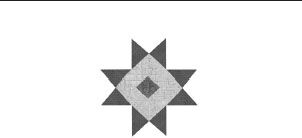
HONOR HAD SLEPT IN so many beds by the time she got to Wellington that when she woke she did not remember where she was. Her dress and shawl were hanging over a chair, but she could not recall undressing or putting them there. She sat up, certain that it was not early morning, when she usually rose. She was wearing an unfamiliar cotton nightgown that was too long for her, and covered with a light quilt.
Wherever she was, there was no doubt that this was America. The quality of the sunlight was different – yellower and fiercer, biting through the air to warm her. Indeed, it was going to be a hot day, though at the moment it was fresh enough for her to be grateful for the quilt. She ran her hand over it: unlike most American quilts she had seen so far, this one was not appliquéd or pieced squares, but proper English patchwork, well made, so that while the cloth was faded, there were no tears or loose seams. The design was of orange and yellow and red diamonds that made up a star in the centre of the quilt – a Star of Bethlehem like Biddy’s quilt, and what Donovan had described his mother making. Recalling her encounter with him the day before, Honor shuddered.
Though of a good size, and containing the bed she had slept in, the room was not a bedroom so much as a storeroom. Bolts of cloth leaned against the walls, many of them white but also solid colours, plaids and floral prints. Spilling out of open chests of drawers were gloves, ribbons, wire, lace and feathers dyed in bright colours. In one corner, dominating the room, smooth blocks of wood in oval and cylindrical shapes were precariously stacked, as well as peculiar oval and circular bands like wheels or doughnuts, some of wood, others made of a hard white material Honor did not recognise. She leaned forward to study them more closely. The blocks reminded her of heads. When Thomas had left her off late the evening before, she’d entered a shop of some kind. While at the time she had been too tired to take note of it, now she understood: she was in a milliner’s storeroom.
Quaker women did not wear hats, but plain caps and bonnets, and usually made their own. Honor had only been into the milliner’s in Bridport a few times to buy ribbon. She had often peeked in the window, however, to admire the latest creations displayed on their stands. It had been a tidy, feminine space, with floorboards painted duck-egg blue and long shelves along the walls filled with hats.
On top of the dresser full of trimmings was a china jug decorated with pink roses sitting in a matching basin, the same Honor had seen in homes all across Pennsylvania. She used them now to wash, then dressed and smoothed her dark hair, noting as she put on her cap that her bonnet was missing. Before she went down, she glanced out of the window, which overlooked a street busy with pedestrians and horses and wagons. It was a relief to see people again after a day on the empty road through the woods.
Honor crept down the stairs and entered a small kitchen with a fire and range, a table and chairs, and a sideboard sparse with dishes. The room felt underused, as if little food were prepared there. The back door was open, bringing in a breeze that passed through the kitchen and into the front room. Honor followed it to the heart of the house.
In many respects the shop was like the Bridport milliner’s: hats on shelves lining the walls, hats and bonnets on stands on tables around the room, glass cases along the sides displaying gloves and combs and hat pins. A large mirror hung on one wall, and two front windows made the room light and airy. The floorboards were not painted but worn smooth and shiny from customers’ feet. In one corner on a work table were hats in various stages of construction: layers of straw moulded around carved wood hat blocks, drying into shape; brims sewn into ovals and awaiting their crowns; hats banded with ribbon, a pile of silk flowers waiting to be attached among a tangle of ribbons and wire. There was little order on the table; the order lay in the finished hats.
In another way the room was completely different, as so many things about America felt to Honor. Where the Bridport shop was orderly by design, the Wellington milliner’s felt as if it had come about its order by accident. Some of the shelves were crammed with hats while others were bare. The room was bright but the windows dusty. Though the floor looked as if it had been swept clean, Honor suspected the corners housed dustballs. It felt as if the shop had sprung up suddenly, whereas Honor knew that her great-grandmother would have bought plain ribbons from the Bridport milliner’s.
The hats and bonnets too were peculiar. Though no expert in trimmings since she wore none herself, Honor was startled by some of the things she saw. A straw hat with a shallow crown pinned with a huge bunch of plaid roses. Another flat hat rimmed with a cascade of coloured ribbons bound together with lace. A cottage bonnet with a deep crown much like Honor’s own, but with white feathers lining the inside rim rather than the usual white ruffles. Honor could wear none of them, for Quakers followed rules of simplicity in dress as well as in conduct. Even if she could she was not sure she would want to.
Yet these hats must sell, as the shop was full of women and girls, gathered around the tables, sorting through frilly caps and sun bonnets, plucking at baskets of pre-cut ribbons and cloth flowers, laughing and chattering and calling out.
After a moment she noticed a woman standing behind the back counter, surveying the room with an experienced air. This was the proprietress, whom Honor had met briefly the night before. She caught Honor’s eye and nodded. She was not at all what you would expect of a milliner. Tall and thin, she had a bony face and a sceptical air. Her hazel eyes bulged slightly, the whites tinged with yellow. For a milliner she wore a surprisingly simple white cap, with a burst of scrubby fair hair hanging on her forehead. Her tan dress hung from her shoulders and exposed a ridge of collarbone. She reminded Honor of the scarecrows hanging on wooden frames in Dorset gardens. The contrast between her angular plainness and the frilly wares she sold made Honor want to smile.
‘What you grinnin’ at, Honor Bright?’
Honor started. Donovan had entered the shop, his heavy tread among the customers causing them to fall silent and take a collective step back.
Honor remained still. She did not want to cause a fuss, so she simply said, ‘I wish thee good day, Mr Donovan.’
Donovan rested his eyes on her. ‘I was passing and saw you in here. And I thought to myself, “Why in hell did Old Thomas leave a Quaker girl at Belle Mills’s when she can’t wear none of the hats?”’
‘Donovan, don’t be so rude to our guest, or she’ll go right back to England and tell everyone what bad manners American men have.’ Belle Mills had come out from behind the counter, and turned her attention to Honor. ‘You’re English, ain’t you, Miss Bright? I could tell from the stitching ’round your neckline. Looks like something only an Englishwoman would think up. I never seen such a striking detail, certainly not on a Quaker woman’s dress. Very fine, that. Simple. Effective. Did you design it or copy it from something?’


